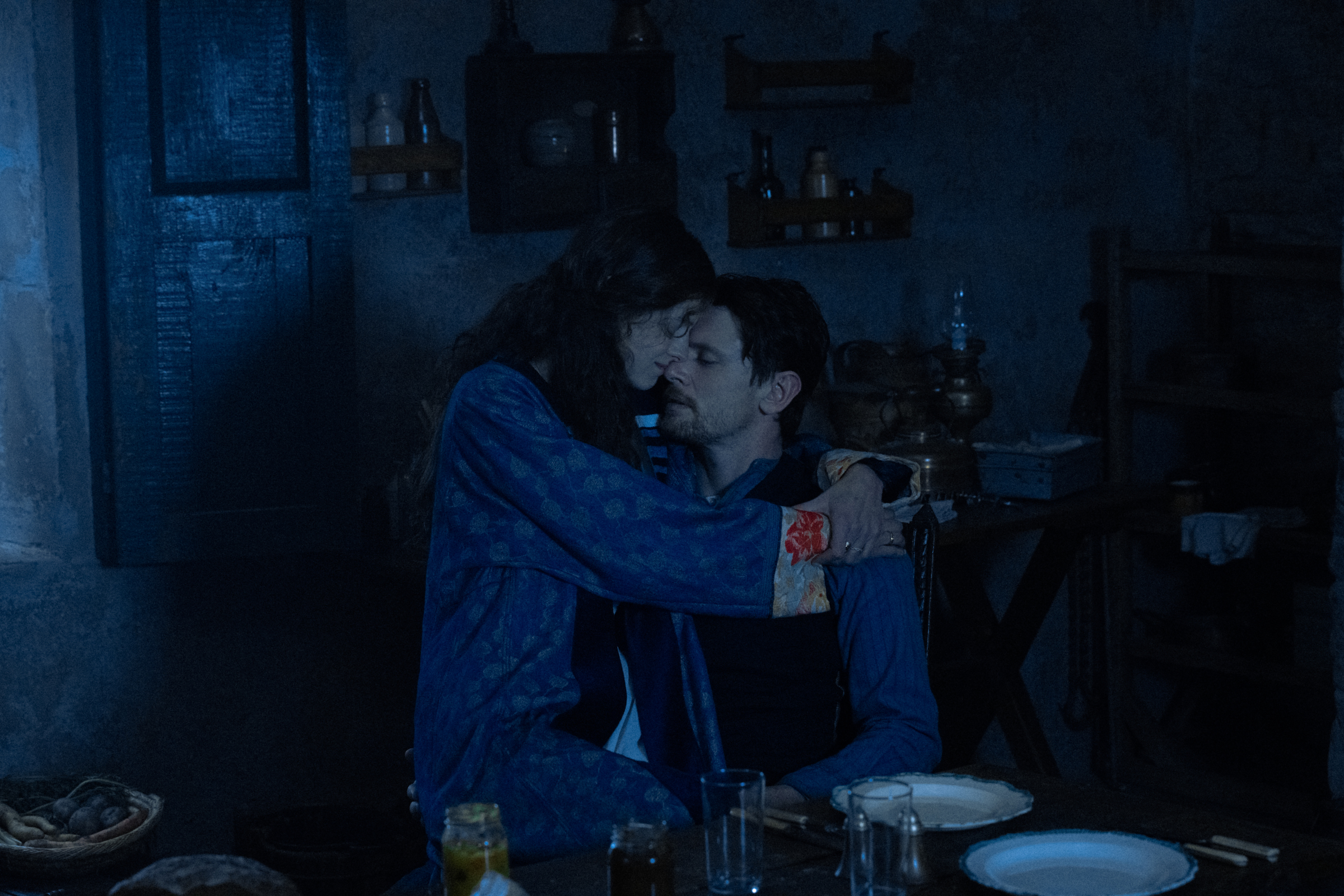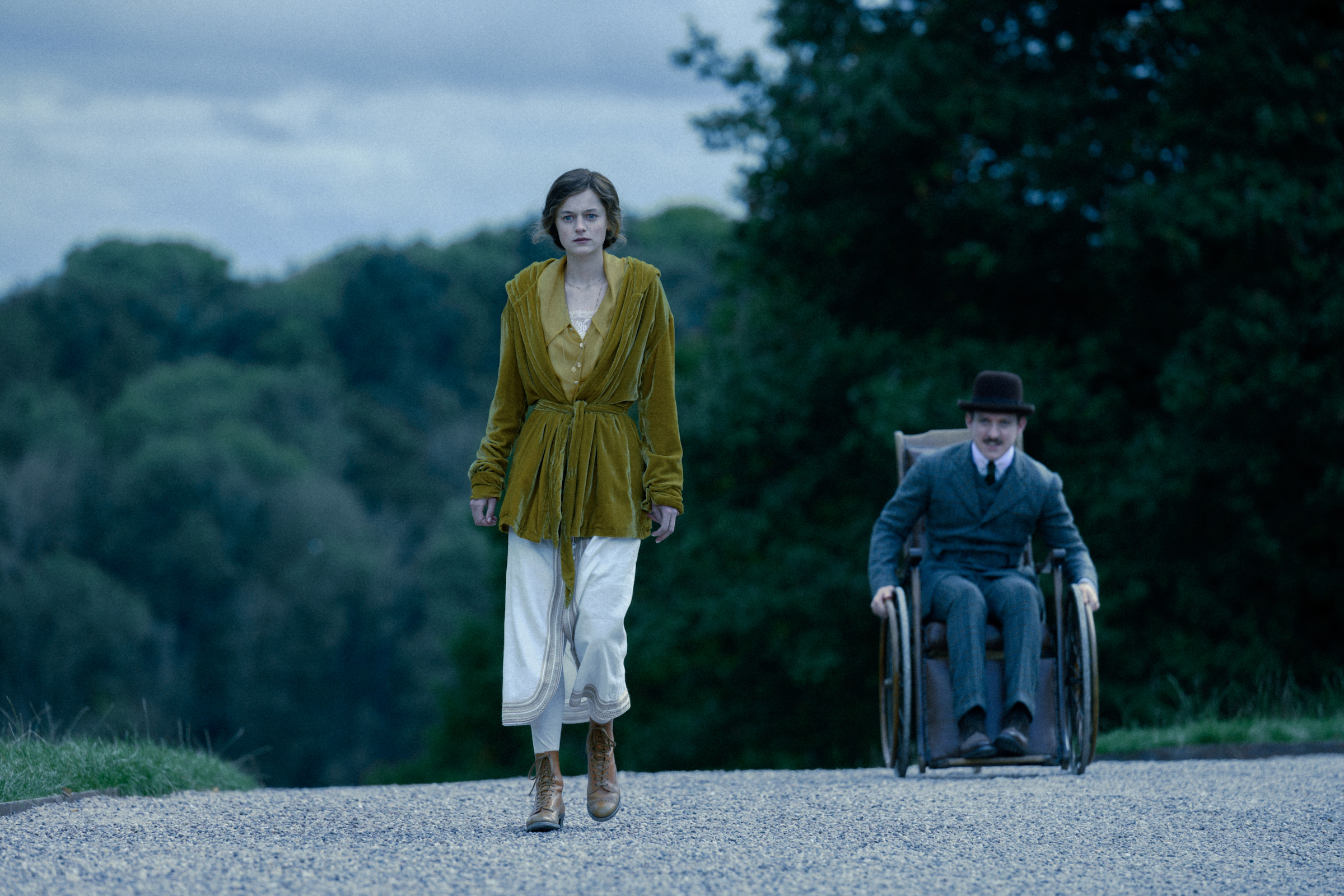The fact that Lady Chatterley’s Lover has landed on Netflix—a mainline to pop culture—would have shocked the public as recently as 1960. English author D. H. Lawrence’s novel tells the story of a young married woman (Connie Chatterly), her husband’s gamekeeper (Oliver Mellors), and the forbidden love between them. The book was first published privately in 1928, but it wasn’t until 1959 that a ban on the book was lifted in the U.S., and 1960 that an uncensored version was published in the United Kingdom.
Lawrence’s novel was also banned for obscenity in Canada, Australia, India, and Japan. It soon became infamous for its explicit descriptions of sex, use of four-letter words, and depiction of a relationship between an upper-class woman and a working-class man. Perhaps most outrageous at the time, though, was the author’s portrayal of female sexual pleasure.
“His statement is still so vivid. We are going through times today with Roe vs. Wade, the revolution in Iran, where the body of the woman is the subject of political tensions,” Laure de Clermont-Tonnerre, the director of the new movie, told W Magazine. “That, for me, was what I really wanted to express with this version.”
Read more: Netflix’s Steamy Lady Chatterley’s Lover Breathes Fresh Life Into a Once-Forbidden Novel
Why Lady Chatterley’s Lover’s was censored
D.H. Lawrence’s Lady Chatterley’s Lover was ostensibly censored for being indecent and immoral: In the U.S., it was banned under obscenity laws, and in England, it was blocked by the Obscene Publications Act.
The novel initially had two small private runs—one in Italy in 1928 and one in France a year later—as Lawrence couldn’t obtain commercial publication for the uncensored book in either England or the U.S. In 1932, however, two years after Lawrence’s death, heavily censored editions were published in both countries. Until 1959, strict obscenity laws in England barred any “purple passages” that could potentially corrupt unsullied minds.
Passed in 1959, the Obscene Publications Act was intended “to provide for the protection of literature and to strengthen the law concerning pornography.” Just one year later, Lady Chatterley’s Lover, finally published in full by Penguin Books, became a test case for the law.
In a piece for The Guardian in 2010, lawyer and academic Geoffrey Robertson explained that Penguin was selling the book at a price accessible to women and the working class—and that this was the key factor in the decision to prosecute. That was what “the upper-middle-class male lawyers and politicians of the time refused to tolerate,” he wrote.
In 1959, the publisher of Grove Press sued the U.S. Post Office for confiscating uncensored versions of the novel in the mail. Court of Appeals Judge Frederick van Pelt Bryan held that the novel had significant literary merit, ruling that to exclude Lady Chatterley’s Lover from being mailed on the grounds of obscenity would “fashion a rule which could be applied to a substantial portion of the classics of our literature” and that “such a rule would be inimical to a free society.”
PEN America, a nonprofit that aims to defend free expression, includes an op-ed about the work on its website. It was not just Connie’s adultery that was so scandalous at the time, it posits, but also her choice of a partner—and the author’s failure to condemn the relationship.
“And that this partnership—for that is what it is, unlike the vassal/lord relationship between her and her husband—is sustained, and triumphs in the end,” the op-ed continues, “is unbearable for those who like their marriages traditional, their women meek, and their ruling class upheld.”

What overturning censorship meant for the culture
The poet Philip Larkin wrote a tongue-in-cheek quip about Lady Chatterley’s Lover in his 1967 poem, “Annus Mirabilis.”
Sexual intercourse began
In nineteen sixty-three
(Which was rather late for me) –
Between the end of the Chatterley ban
And the Beatles’ first LP.
Some have argued that the sexual revolution of the 1960s was heralded by these two landmark events. And indeed, Lady Chatterley’s Lover was the first of three erotic novels to be un-banned in the U.S. between 1959 and 1966 (the others were Henry Miller’s Tropic of Cancer and John Cleland’s Fanny Hill.)
“For many decades, the courts upheld racial segregation; then, suddenly, they didn’t,” Fred Kaplan wrote for the New York Times. “For many decades, the courts let the Post Office decide which books people could read; then, suddenly, they didn’t. In both cases, and many others that could be cited, the laws hadn’t changed; society did. And the courts responded accordingly.”
Grove Press’ success in court effectively overturned America’s obscenity laws—or at least knocked over the first domino. It also granted the public access to art about female sexual pleasure. The author championed the idea of true passion necessitating both a physical and mental connection.
“Obscenity only comes in when the mind despises and fears the body,” he writes in the book, “and the body hates and resists the mind.”

Laure de Clermont-Tonnerre’s new adaptation on Netflix
The director—known for the 2019 drama The Mustang—received the script for the film in March 2020, just as the pandemic was beginning. The need for human connection drew her to the film, especially as loneliness felt magnified.
“I felt I needed to bring this as well, but as a revitalization of a human being, as something that heals,” Clermont-Tonnerre told W Magazine. “Especially the scene where they’re running under the rain naked—there’s something so erotic and so liberating.”
Connie Chatterley (Emma Corrin) and Oliver Mellors (Jack O’Connell), the gamekeeper on her husband’s estate, come from drastically different social classes—a fact that Lawrence very intentionally highlighted. Lady Chatterley’s husband, Clifford Chatterley (Matthew Duckett), is a baronet who becomes hellbent on “fixing” the Tevershall coal mines, which he owns. In Laure de Clermont-Tonnerre’s film, the husband and wife spar over the working conditions in the mines.
During one conversation, Clifford smugly tells Connie that “Most of those men have been ruled since time began,” to which she responds incredulously “And you can rule them?” Clifford explains that he has been raised and trained to fulfill this role, and when she asks if he believes that they and the miners share any humanity, he replies: “We all need to eat and breathe, but beyond that, no.”
Connie and Mellors “are very similar personalities and beyond class and status, there’s something that connects immediately,” Clermont-Tonnerre said. “These emotions lead to a physical expression, which defines their relationship as a celebration. It is first an emotional love story about two lonely people who feel the need to connect to exist.”
More Must-Reads from TIME
- Donald Trump Is TIME's 2024 Person of the Year
- Why We Chose Trump as Person of the Year
- Is Intermittent Fasting Good or Bad for You?
- The 100 Must-Read Books of 2024
- The 20 Best Christmas TV Episodes
- Column: If Optimism Feels Ridiculous Now, Try Hope
- The Future of Climate Action Is Trade Policy
- Merle Bombardieri Is Helping People Make the Baby Decision
Contact us at letters@time.com